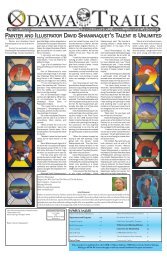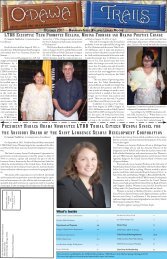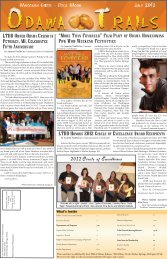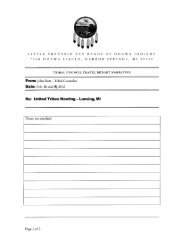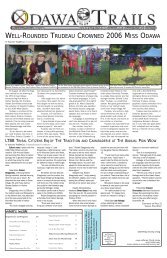April - Little Traverse Bay Bands of Odawa Indians
April - Little Traverse Bay Bands of Odawa Indians
April - Little Traverse Bay Bands of Odawa Indians
You also want an ePaper? Increase the reach of your titles
YUMPU automatically turns print PDFs into web optimized ePapers that Google loves.
<strong>April</strong> 2012 <strong>Odawa</strong> Trails<br />
17<br />
Wednesday, Feb.22, 2012<br />
NMU RECEIVES NEA GRANT TO REVI-<br />
TALIZE ANISHINAABE ARTS<br />
MARQUETTE— Northern Michigan University’s<br />
Center for Native American Studies has been<br />
awarded a $22,000 grant from the National Endowment<br />
for the Arts. The center will partner with the<br />
tribal historic preservation <strong>of</strong>fice at the Lac Vieux<br />
Desert Band <strong>of</strong> Lake Superior Chippewa to launch<br />
“Creating and Learning Art in Native Settings,” or the<br />
CLANS project.<br />
The goal <strong>of</strong> the project is to revitalize traditional<br />
Anishinaabe dances, songs and art through an intensive<br />
week-long summer program featuring 11 recognized<br />
American Indian artists. The program will be held at<br />
the Old Indian Village in Watersmeet, Mich. American<br />
Indian middle school or high school youth from<br />
Michigan, Wisconsin and Minnesota are invited to<br />
apply.<br />
“This arts education project is designed to teach<br />
traditional arts to American Indian youth in a Native<br />
community,” said <strong>April</strong> Lindala, director <strong>of</strong> the NMU<br />
center. “We will combine active learning within a cultural<br />
context and cultural environment. Youth will<br />
learn not only how to make items such as black ash<br />
baskets and cattail mats, but they will learn how to<br />
seek out and collect the materials. This will give us a<br />
vehicle to discuss with youth the cultural significance<br />
<strong>of</strong> respecting the natural environment, as well as how<br />
treaties can serve as a guide for gathering natural resources.”<br />
Youth participants will also learn Anishinaabe<br />
songs, dances and regalia-making during the project.<br />
Lindala said many American Indian youth have not<br />
been taught the origins and stories <strong>of</strong> traditional social<br />
Editor’s note: The following is a press release<br />
dated February 20, 2012.<br />
Fredericks Peebles & Morgan LLP has successfully<br />
garnered a landmark ruling in suits brought by the State<br />
<strong>of</strong> Colorado against two tribally-owned online businesses.<br />
Those suits threatened tribal sovereignty and<br />
the ability <strong>of</strong> the tribes to operate businesses for the<br />
purpose <strong>of</strong> economic development. The two businesses<br />
are separately owned and operated by the Miami Tribe<br />
<strong>of</strong> Oklahoma and by the Santee Sioux Nation, both<br />
federally-recognized Indian tribes. The Denver District<br />
Court ruling, captioned State <strong>of</strong> Colorado v. Cash Advance,<br />
is expected to have a major impact on the ability<br />
<strong>of</strong> other tribes and their economic development entities<br />
to do business both in Indian Country and over the internet.<br />
The ruling also outlawed state-issued subpoenas<br />
that would have required the two tribal companies to<br />
provide documents and other proprietary information,<br />
which the Tribes claimed that the State had no right to<br />
demand. Contempt citations and bench warrants aimed<br />
at the tribal entities and their <strong>of</strong>ficers for failing to<br />
comply with the subpoenas were also discharged under<br />
the ruling.<br />
Lead attorneys for Fredericks Peebles & Morgan<br />
were Conly Schulte and Shilee Mullin. Firm attorneys<br />
argued that the suits brought by the State <strong>of</strong> Colorado<br />
had no merit because the companies are wholly-owned<br />
arms <strong>of</strong> federally-recognized Indian tribes, and they are<br />
therefore immune from the subpoenas and enforcement<br />
orders under the doctrine <strong>of</strong> tribal sovereign immunity.<br />
The Colorado Attorney General had argued that the<br />
tribally-owned businesses were not immune from suit<br />
on the ground that they engaged non-tribal members<br />
in some <strong>of</strong> their operations. The Denver District Court<br />
disagreed, holding, “The Miami and Santee people are<br />
songs and dances.<br />
“Even the most traveled powwow dancer may only<br />
see, for example, the ‘fish dance’ or the ‘buck and doe<br />
dance’ performed once or twice a year,” she said. “Tribal<br />
community leaders are eager to see our young people<br />
learn how to do these dances so the cultural significance<br />
will not be lost. We want youth to learn these<br />
songs and dances with the objective <strong>of</strong> being able to<br />
share them at an event such as a community powwow<br />
or with their friends in their own communities.”<br />
The name <strong>of</strong> the project comes from the term<br />
clan, or dodem, which is defined as one’s extended<br />
family within the tribe. Lindala said many tribal nations<br />
have multiple clans—for example, bear, crane,<br />
loon or turtle—and traditionally, each group has a responsibility<br />
to the tribe as a whole.<br />
“The CLANS project is about sharing these cultural<br />
teachings with the message that our youth will<br />
then have the responsibility to share what they learned<br />
with others, just as clans have a responsibility to their<br />
tribes,” she added.<br />
The Center for Native American Studies is receiving<br />
additional support for this project from the<br />
NMU College <strong>of</strong> Arts and Sciences. Other project<br />
partners include the Keweenaw <strong>Bay</strong> Indian Community’s<br />
Youth Program, the Hannahville Indian School,<br />
the Hannahville Indian Community’s Youth Program<br />
and the Great Lakes Indian Fish and Wildlife Commission,<br />
which represents eleven tribes in Michigan,<br />
Wisconsin and Minnesota.<br />
For more information about the CLANS project,<br />
contact the NMU Center for Native American Studies<br />
at 906-227-1397 or visit www.nmu.edu/nativeamericans.<br />
Prepared by Kristi Evans/<strong>April</strong> Lindala.<br />
FREDERICKS PEEBLES & MORGAN LLP<br />
SECURES LANDMARK COURT RULING ON<br />
TRIBAL SOVEREIGNTY<br />
the ones we must trust . . . to know what kinds <strong>of</strong> business<br />
relationships are in their best interests. They do<br />
not need the guidance <strong>of</strong> the State <strong>of</strong> Colorado, through<br />
either its law enforcement <strong>of</strong>ficials or its courts.”<br />
"The Court's decision is groundbreaking for its<br />
application <strong>of</strong> the principles <strong>of</strong> tribal sovereignty to<br />
modern day tribal economic development activities,”<br />
said Conly Schulte, an attorney with Fredericks Peebles<br />
& Morgan, who argued the cases before the Colorado<br />
courts. “It stands for the proposition that State <strong>of</strong>ficials<br />
have no right to impose their paternalistic values upon<br />
Tribes' business decisions.”<br />
The original suit brought by the State suggested<br />
that the two businesses were in violation <strong>of</strong> Colorado<br />
law for doing business with Colorado consumers over<br />
the internet without having a license from the State.<br />
After several years <strong>of</strong> wrangling over whether the tribal<br />
entities could be forced to comply with the State’s subpoenas,<br />
the Colorado Supreme Court ruled that tribal<br />
immunity applies to businesses that are arms <strong>of</strong> their<br />
respective Indian tribes, regardless <strong>of</strong> whether the activities<br />
are commercial or governmental in nature, or<br />
whether the activities take place on or <strong>of</strong>f tribal lands.<br />
The Supreme Court sent the case back to the District<br />
Court for a determination <strong>of</strong> whether the tribal businesses<br />
were arms <strong>of</strong> their respective Tribes, and the District<br />
Court ruled in favor <strong>of</strong> the Tribes.<br />
“This decision will have a monumental positive<br />
effect in Indian Country and on tribes who are trying<br />
to build their economies and improve the lives <strong>of</strong> their<br />
people through many diverse business opportunities,”<br />
said Shilee Mullin, an attorney with Fredericks Peebles<br />
and Morgan. “The firm is pleased to have had an important<br />
role in securing this ruling that helps protect<br />
and preserve tribal sovereign immunity which has been<br />
threatened by a variety <strong>of</strong> organizations.”<br />
Fredericks Peebles & Morgan LLP is dedicated to<br />
the representation <strong>of</strong> American Indian tribes and Native<br />
American organizations throughout the United States.<br />
Legal services provided by Fredericks Peebles & Morgan<br />
LLP include a wide spectrum <strong>of</strong> services related to Indian<br />
concerns in the areas <strong>of</strong> business transactions, litigation,<br />
and governmental affairs. Visit our website at<br />
www.ndnlaw.com



